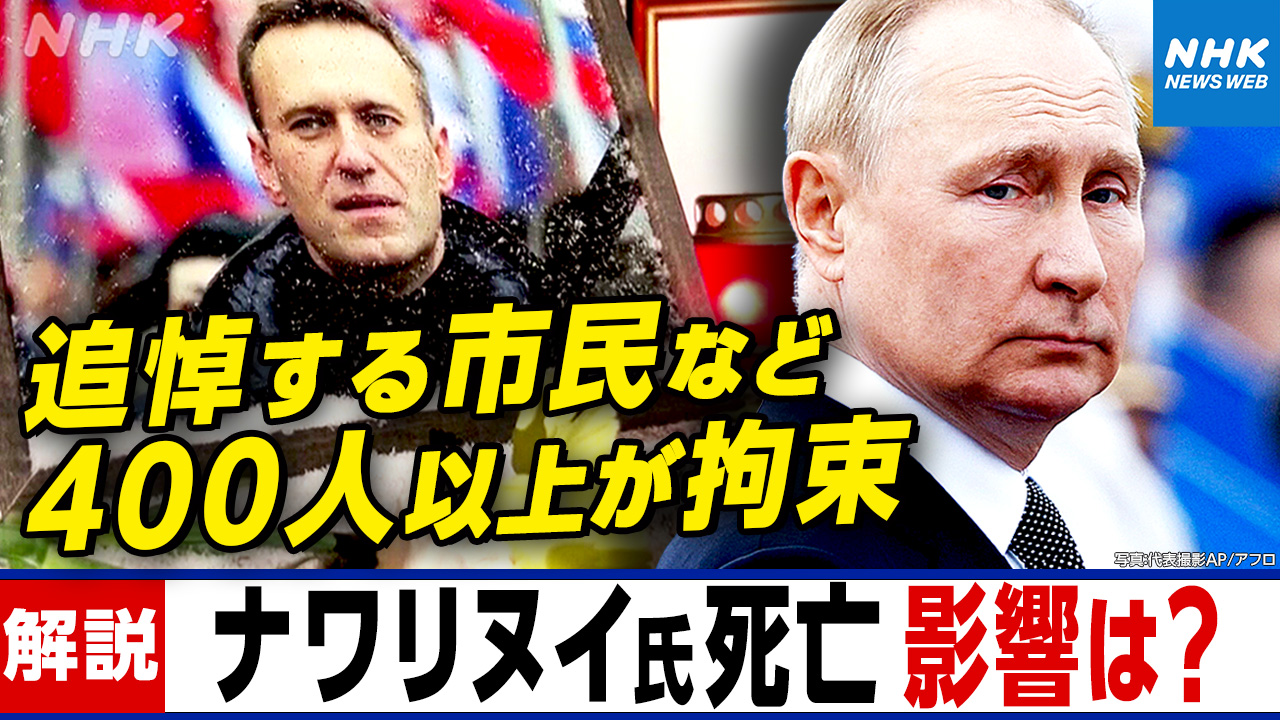Mr. Navalny, who was known as one of Russia's most vocal critics of the Putin administration and was imprisoned in prison, died, and people could be seen mourning his death in St. Petersburg and other parts of Russia.
However, according to human rights groups, more than 400 people, including those who came to pay their respects, were detained, and Russian authorities are believed to be nervous about the growing number of voices criticizing the Putin administration.
Navalny's death has shocked the world.
What is the background of death? What impact will it have on the future?
"Catch! World's Top News" Caster Asami Mochizuki's commentary.
(Broadcast on February 19th)
*The video is 10 minutes and 26 seconds long and cannot be viewed on data broadcasting.
*The second half of the video is an explanation of the situation in Ukraine, where the Russian military was forced to withdraw from Audiiivka in the east, where they were intensifying their attacks.
What was the background to Navalny's death?
Castor
Navalny Mochizuki was known around the world as an outspoken critic of the Putin administration, and CNN in the US described him as ``the end of an era for Russia.''
There have been a number of related reports over the weekend, but the ones that stand out are those that examine the background to the deaths and the impact they will have on the future.
The reason behind his death is the Russian presidential election to be held on March 17th.
Navalny has called on people to vote for candidates other than Putin in the presidential election.
Although it cannot be determined whether the Putin administration was involved in Navalny's death, not only is Putin's biggest political opponent gone, but his domestic opposition has also been subdued, with the Washington Post saying, ``Putin now has no competition.'' ”.
What will be the future impact?
On the other hand, regarding the future impact, it is pointed out that there is a possibility that there will be a movement within Russia to view Mr. Navalny as a hero, and that Western countries may strengthen their solidarity against Putin and accelerate support for Ukraine.
The Putin administration is likely to be wary of any move to memorialize Navalny for the time being.
Mother's body not handed over
Regarding Navalny, who continued to criticize Russia's Putin regime and died in prison on the 16th, a spokesperson for Navalny confirmed the death by saying in a video released on the 17th, ``Navalny was murdered.'' clarified.
A spokesperson said they would wait for an official conclusion regarding the circumstances at the time and would request that the body be returned to the family.
However, after hearing from prison officials about the whereabouts of Mr. Navalny's body, his mother and lawyer went to the location, but the body was not there, so the situation continues to prevent him from being extradited.
Additionally, the authorities have not announced the detailed cause of death, but according to an executive from a support group, his mother and lawyer who visited the prison were told that the cause of death was ``sudden death syndrome.''
More than 400 people detained as people mourn Navalny in various locations
Following the death of Mr. Navalny, who was imprisoned in prison on the 16th and was known as one of Russia's leading critics of the Putin regime, movements to commemorate Mr. Navalny continued on the 17th in various parts of Russia.
In St. Petersburg, the second largest city, people gathered in front of a monument to Soviet-era political repression to mourn the deaths, holding prayers and laying flowers amid security forces. .
An 83-year-old woman held up a card reading ``He was not killed, he was murdered,'' and said, ``My heart aches for him and for this country, which is on the verge of destruction. "I can't believe in the future. I feel like the current situation is worse than the Stalin era in the Soviet Union," he lamented.
The woman appears to have been detained for a time after this.
According to human rights groups, more than 400 people were detained in 32 cities including St. Petersburg and the capital Moscow from the 16th to the 17th, and authorities are nervous about the spread of voices criticizing the Putin administration. It seems that it is.

